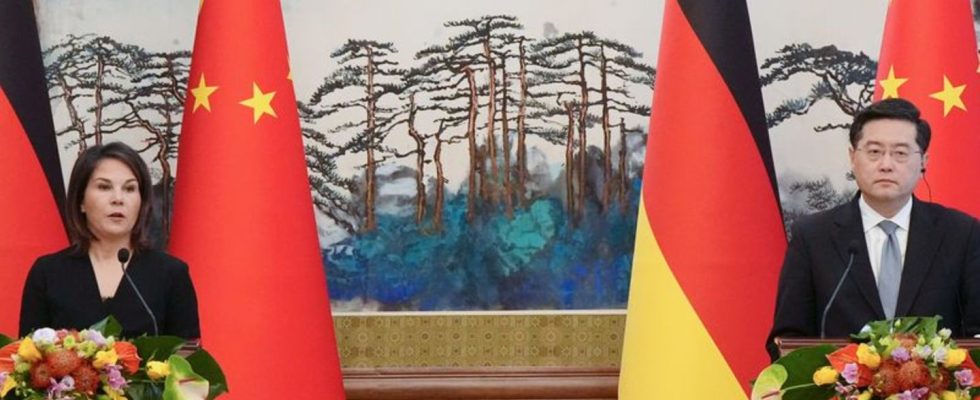federal government
Dispute in traffic light coalition about future China strategy
Foreign Minister Annalena Baerbock and Chinese Foreign Minister Qin Gang (r) give a joint press conference. photo
© Soeren Stache/dpa
The Foreign Minister is still in Asia, but at home a controversial debate has broken out in the governing alliance. How should Germany deal with China in the future?
An open dispute about the future course towards China has broken out in the traffic light coalition. Green politicians have criticized a strategy paper by the conservative wing of the SPD, which warns of an “anti-China” strategy. Green parliamentary group leader Andreas Audretsch told the German press agency: “China is a partner, competitor and systemic rival at the same time – recognizing that is the basis of a serious China policy. In the SPD, that still doesn’t seem to have arrived in parts.” The refusal to see reality has made Germany and Europe dangerously dependent on Russia. “It would be negligent to repeat these historical mistakes in China policy.”
opinions
Bundestag Vice President Katrin Göring-Eckardt reacted in a similar way: “I am concerned that the SPD has apparently learned nothing from its Russia policy, which is fatal for Germany. I warn against leading our country into the next dependency,” said the Green Party of the “Welt am Sunday”. When dealing with China as an important trading partner, the following must apply: cooperation yes, dependency no. “To make oneself again dependent on authoritarian powers is the opposite of pragmatism.”
State Secretary for Economic Affairs Franziska Brantner, also a Green, told the dpa: “We have to minimize the risks of economic dependencies in relation to China. We are concerned with de-risking and not de-coupling. I also don’t know anyone serious who has a complete calls for the decoupling of our economies.” A secure supply of energy and raw materials as well as resilient supply chains are central to the business location.
SPD – China policy
The background to the statements is a strategy paper by the Seeheimer Kreis, the conservative wing of the SPD. The district calls for a pragmatic China policy. At the same time, the paper criticizes Foreign Minister Annalena Baerbock and Economics Minister Robert Habeck (both Greens). According to the Seeheimer circle, there should be no “one-dimensional German foreign and economic policy” towards China. The federal government is currently developing a new China strategy.
The parliamentary director of the Greens parliamentary group, Irene Mihalic, told the editorial network Germany (Saturday) that she was glad that the foreign minister was not traveling around without courage and profile, “but clearly articulated our interests and values”. “This is the only way to work as equals.”
Brantner said the German economy must be made more resilient. “To do this, we turn to the world, we diversify our energy supply, we promote trade agreements and fill raw material partnerships with life. I don’t understand why parts of the SPD now seem to want to turn away from this common course.”
Due to its economic and political power, the Seeheimer strategy paper describes China as an important player and partner in addressing global challenges such as climate change, the looming nuclear arms race and the numerous trouble spots. At the same time, China has increasingly developed into a competitor and systemic rival.
Audretsch said that it is now a matter of positioning Europe in a self-confident and economically broad manner. “To do this, we must deepen our relationships with democratic countries worldwide, also economically. Risks and dependencies on China must be reduced and core areas of the European economy must be protected.”
The question is currently being asked in Hamburg, says Audretsch. It was a big mistake that Chancellor Olaf Scholz (SPD) prevented the complete ban on the participation of the de facto Chinese state-owned company Cosco in a port terminal there. The Federal Office for Information Security has now classified the terminal as a critical infrastructure. Audretsch demanded that this lead to a reassessment of the holding. “The federal government should use every opportunity to protect the port from Chinese influence. It’s about our economic independence and geopolitical sovereignty.”
After the reassessment of the port terminal, a spokeswoman for Habeck said that since the conditions had changed, the ministry was now examining the effects on the situation. Last October, the federal cabinet decided on a so-called partial ban, which would allow Cosco to acquire a stake in the terminal, but only under 25 percent.

